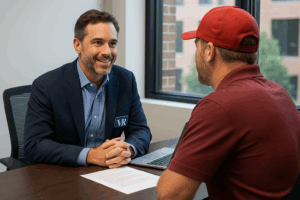Executive Takeaways
-
June 1, 2025 SBA changes demand higher equity and stricter DSCR analysis—VR Business Sales Atlanta navigates these complexities daily.
-
Buyers need 15–25% down payment reality in today’s market, not outdated “10% down” expectations.
-
VR Business Sales’ proven deal structuring turns challenging SBA scenarios into successful closings through seller notes and creative financing.
-
The Atlanta market advantage: VR’s local lender relationships and Georgia-specific expertise accelerate deal timelines.
-
Bridging the buyer-seller gap requires experience—VR’s track record proves why professional structuring matters.
The SBA Landscape Shift: What Changed in June 2025
The Small Business Administration’s June 1, 2025 rule updates didn’t just tweak underwriting—they reshaped how Georgia SBA deals must be structured.
Key Changes:
-
Enhanced Equity Requirements
-
While SBA marketing still highlights “10% down,” most Georgia lenders now require 15–25% equity:
-
Service businesses in metro Atlanta: 20–25% down
-
Asset-heavy manufacturing in suburban Georgia: 15–20% down
-
Hospitality and higher-risk industries: 25–30% equity
-
-
-
Forward-Looking DSCR
-
Banks no longer accept thin margins. A 1.25x DSCR that passed in 2024 may now fail under stress testing.
-
-
Seller Note Complexity
-
Seller financing is still viable but requires sophisticated subordination and standby agreements to satisfy lender and regulatory requirements.
-
Why VR Business Sales Atlanta Excels at SBA Deal Structure
1. Realistic Buyer Preparation
-
VR pre-qualifies buyers with SBA-preferred lenders.
-
Sets realistic 15–25% down payment expectations early.
-
Identifies potential deal-killers upfront.
2. Seller-Friendly SBA Structures
VR turns seller notes into deal enablers:
-
Standby periods (12–24 months) protect cash flow.
-
DSCR triggers pause payments if performance dips.
-
Tax benefits through installment sale treatment.
-
Transition credits included in SBA loans to compensate sellers for training.
3. Lender Relationship Management
VR’s Atlanta network includes:
-
Community banks specializing in Georgia SBA loans.
-
Regional SBA preferred lenders with fast-track authority.
-
Alternative lenders for creative structures.
-
Equipment financiers for asset-heavy deals.
The VR Advantage: Bridging Buyer-Seller Gaps
Communication Management
-
Clear expectation setting.
-
Regular progress updates.
-
Fast resolution of issues before they derail deals.
Deal Structure Innovation
-
Hybrid SBA + seller note financing.
-
Performance-based seller note adjustments.
-
Tax optimization aligned with SBA compliance.
Local Market Expertise
-
Deep knowledge of Atlanta and Georgia industries.
-
Familiarity with state-specific regulations and tax rules.
-
Strong relationships with local CPAs, attorneys, and bankers.
Current Market Realities Buyers Must Understand
-
Down payments are higher:
-
Service businesses: 20–25%
-
Asset-heavy: 15–20%
-
Risky industries: 25–30%
-
-
DSCR is tested harder:
-
Recession scenarios, industry volatility, and transition risk now modeled.
-
-
Timeline expectations:
-
Straightforward SBA: 45–60 days
-
SBA with seller notes: 60–90 days
-
Complex restructures: 90+ days
-
Making SBA Loans Work for Sellers
Many sellers resist SBA loans, but VR demonstrates how these deals maximize value:
Value Maximization
-
SBA financing often supports higher valuations.
-
Expands the qualified buyer pool.
Risk Mitigation
-
SBA underwriting ensures buyer capability.
-
Subordinated seller notes protect seller repayment.
Tax Benefits
-
Installment treatment spreads tax liability.
-
Depreciation recapture timing reduces impact.
-
1031 exchange options on real estate components.
The VR Process: From Listing to Closing
Phase 1: Preparation
-
Financial cleanup.
-
SBA-lender-ready valuation.
Phase 2: Buyer Qualification
-
Pre-qualified network.
-
Fit + financial vetting.
Phase 3: Deal Structuring
-
Multiple scenario models.
-
Pre-approvals secured.
Phase 4: Closing Management
-
Tight timeline coordination.
-
Issue resolution.
-
Post-closing support.
Why Timing Matters in Georgia’s 2025 Market
Rates & Regulation
-
SBA rates remain competitive.
-
June 2025 changes are now normalized into underwriting.
Economics
-
Georgia valuations remain strong.
-
Buyer demand is high; sellers are motivated.
The Bottom Line: Why VR Business Sales Gets Deals Done
The June 2025 SBA changes raised the bar. Deals still close—but only with the right structure and experienced execution.
VR Business Sales Atlanta brings:
-
Proven SBA track record across Georgia.
-
Deep lender relationships.
-
Market intelligence on what’s working today.
-
Creative structuring expertise.
VR doesn’t just facilitate transactions—they architect SBA solutions that get deals across the finish line.
Frequently Asked Questions
Q1: What is VR Business Sales Atlanta SBA financing?
It’s the way VR Business Sales Atlanta structures SBA loans, seller notes, and DSCR requirements to help both buyers and sellers close deals successfully in Georgia.
Q2: How much down payment is needed for SBA loans in Georgia in 2025?
Most lenders now require 15–25% down. Service businesses usually need closer to 20–25%, while asset-heavy businesses may qualify with 15–20%.
Q3: What is DSCR and why is it important in SBA financing?
DSCR (Debt Service Coverage Ratio) measures how easily business cash flow can cover loan payments. Lenders typically require at least 1.25x, and in 2025 they test DSCR against different scenarios like recessions or ownership transitions.
Q4: How do seller notes work in SBA deals?
Seller notes provide flexible financing but must be subordinated to the SBA loan and often set on 12–24 months of standby before payments start, so lenders are comfortable with cash flow.
Q5: Why should sellers work with VR Business Sales Atlanta?
Because VR combines strong lender relationships, Georgia-specific expertise, and proven structuring methods that protect seller interests while ensuring deals close smoothly.


